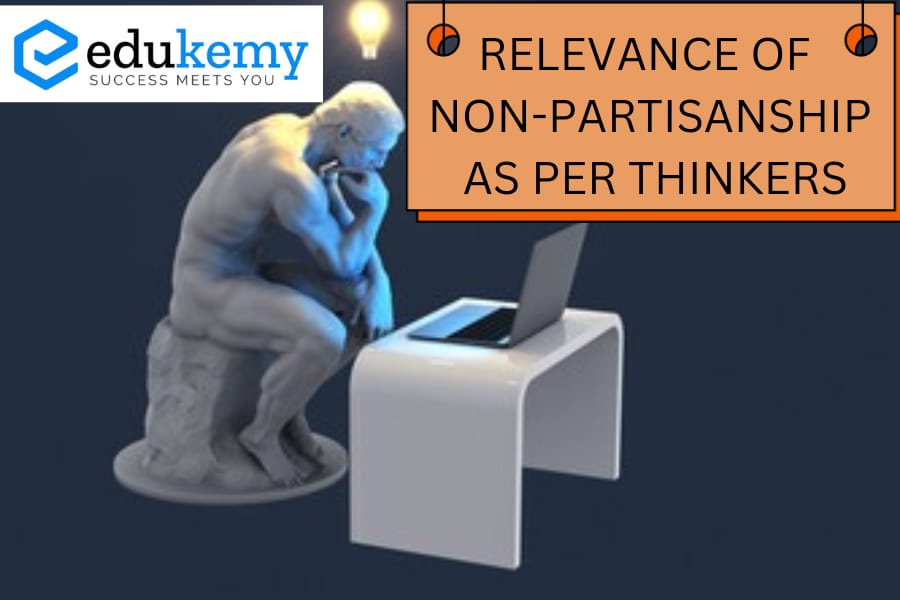
Non-partisanship, the concept of remaining neutral or unbiased in political matters, has been a subject of discussion among various thinkers throughout history. Here are some perspectives on its relevance:
Contents
- 0.1 George Washington:
- 0.2 Alexander Hamilton:
- 0.3 John Stuart Mill:
- 0.4 Jean-Jacques Rousseau:
- 0.5 John Rawls:
- 0.6 John Dewey:
- 0.7 Amartya Sen:
- 1 FAQs
- 1.1 Q: What is non-partisanship, and why is it important?
- 1.2 Q: How do thinkers view the role of non-partisanship in political discourse?
- 1.3 Q: What are the dangers of excessive partisanship, according to thinkers?
- 1.4 Q: How can societies cultivate a culture of non-partisanship?
- 1.5 Q: What are some contemporary challenges to non-partisanship, and how can they be addressed?
- 2 In case you still have your doubts, contact us on 9811333901.
George Washington:
In his farewell address, Washington warned against the dangers of political parties, suggesting that they could lead to factionalism and division. He advocated for non-partisanship as a means of promoting unity and the common good.
Alexander Hamilton:
In Federalist No. 68, Hamilton argued for the independence of the Electoral College from party politics, emphasizing the importance of selecting the president based on merit rather than partisan allegiance.
John Stuart Mill:
Mill believed in the importance of open debate and the free exchange of ideas in a democracy. He argued that non-partisanship allows for a more rational and inclusive discussion of issues, as individuals are not bound by loyalty to a particular party or ideology.
Jean-Jacques Rousseau:
Rousseau warned against the influence of factions on the general will, suggesting that partisan interests often conflict with the common good. He advocated for a form of non-partisanship that prioritizes the collective welfare over narrow partisan interests.
John Rawls:
Rawls’ theory of justice emphasizes the importance of fairness and impartiality in political decision-making. He argues that a just society is one in which individuals are treated with equal concern and respect, regardless of their political affiliations.
John Dewey:
Dewey emphasized the importance of democratic participation and informed deliberation in shaping public policy. He argued that non-partisanship fosters a more deliberative and inclusive form of democracy, where decisions are made on the basis of reason and evidence rather than partisan loyalty.
Amartya Sen:
Sen’s capability approach highlights the importance of enabling individuals to pursue their own conception of the good life. He suggests that non-partisanship is essential for creating a political environment that respects and protects the diverse values and aspirations of all citizens.
FAQs
Q: What is non-partisanship, and why is it important?
Non-partisanship refers to the idea of remaining neutral or unbiased in political matters, without allegiance to any particular political party or ideology. It is important because it fosters unity, promotes rational discourse, and enables decision-making based on the common good rather than partisan interests.
Q: How do thinkers view the role of non-partisanship in political discourse?
Thinkers throughout history, such as George Washington, John Stuart Mill, and Jean-Jacques Rousseau, have emphasized the importance of non-partisanship in promoting unity, fairness, and the pursuit of the common good. They argue that non-partisanship allows for more inclusive and rational political discourse, free from the constraints of narrow partisan interests.
Q: What are the dangers of excessive partisanship, according to thinkers?
Thinkers warn that excessive partisanship can lead to division, polarization, and the prioritization of partisan interests over the welfare of society as a whole. It can hinder cooperation, compromise, and the ability to address pressing issues effectively.
Q: How can societies cultivate a culture of non-partisanship?
Thinkers suggest that cultivating a culture of non-partisanship requires promoting civic education, critical thinking, and a commitment to the principles of fairness, justice, and the common good. It involves encouraging open dialogue, valuing diverse perspectives, and prioritizing cooperation and collaboration over partisan divides.
Q: What are some contemporary challenges to non-partisanship, and how can they be addressed?
Contemporary challenges to non-partisanship include increasing polarization, tribalism, and the influence of special interests in politics. Addressing these challenges requires reforms to campaign finance, electoral systems, and media practices, as well as fostering greater civic engagement and strengthening democratic institutions.
In case you still have your doubts, contact us on 9811333901.
For UPSC Prelims Resources, Click here
For Daily Updates and Study Material:
Join our Telegram Channel – Edukemy for IAS
- 1. Learn through Videos – here
- 2. Be Exam Ready by Practicing Daily MCQs – here
- 3. Daily Newsletter – Get all your Current Affairs Covered – here
- 4. Mains Answer Writing Practice – here

